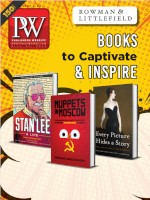In Pobi’s Do No Harm (Minotaur, Aug.), astrophysicist Lucas Page helps the FBI crack a baffling series of murders.
What differentiates Page from other similar brilliant consultants?
He’s an astrophysicist. He’s got a brain that’s just on a level that very few people are at. What made him different is that he’s viewing the entire world through data and numbers, so much so that he blinds himself, sometimes, leaving out the things that are right in front of him, because he’s too busy looking at the data.
You come from a very artistic family and you dealt in 18th-century formal furniture for years. How did that influence you as a writer?
By seeing people who had their focus on things other than performance reviews and a weekly paycheck, I was witness to a lot of creativity that was motivated by nothing more than the desire to create. So it taught me a lot about what is, and isn’t, time-wasting in life. And I suppose the big takeaway from all of that is that the first person an artist has to please is themselves. After that, trickle-down appreciation may or may not be in the cards. That way, you at least make one person happy in the process of chasing the muse.
Page determines the absence of a pattern in the deaths of the doctors is a dead giveaway of a pattern. What’s the appeal of using what’s not visible as a crucial plot point?
Donald Rumsfeld said that there are known unknowns and there are unknown unknowns, things that you don’t even know that you don’t know, that influence an outcome. I find stuff like that fascinating. Human beings recognize patterns. That’s how we survived, because we’re able to focus on things and pick out patterns. You can look at a bunch of leaves and see that there’s a tiger. I just like the concept of Lucas being able to look for what’s not there.
Why did you have Page and his wife adopt five kids?
The way I tend to work is I come up with a story line first, before knowing who the protagonist was going to be. I wasn’t planning on a series, but I wanted a character that I’d enjoy spending time with. I knew he cared about his family. My agent, after I had sent the first draft to her, said there’s too many kids, kill at least three of them. And then I spoke to my editor afterwards, and he said, I wouldn’t have bought the book if you would have killed off some of those kids. We need those five kids because it shows a different side of him.



 Volume 269
Issue 25
06/13/2022
Volume 269
Issue 25
06/13/2022





